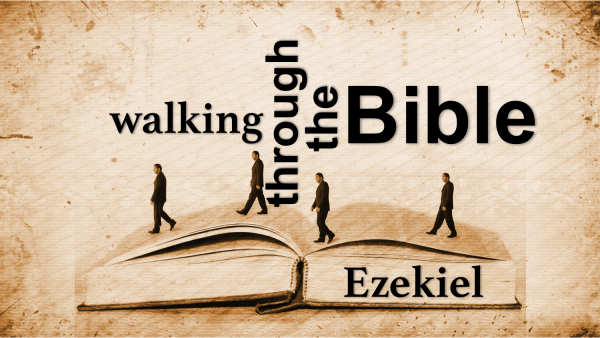There is much to learn about Ezekiel and his book from just the first three verses:
“Now it came to pass in the thirtieth year, in the fourth month, in the fifth day of the month, as I was among the captives by the river of Chebar, that the heavens were opened, and I saw visions of God. In the fifth day of the month, which was the fifth year of king Jehoiachin’s captivity. The word of the Lord came expressly unto Ezekiel the priest, the son of Buzi, in the land of the Chaldeans by the river Chebar; and the hand of the Lord was there upon him” (Ezekiel 1:1-3).
First, it is learned that Ezekiel was a fairly young man to be engaging in such a work as prophesying to the sinful nation as he was but thirty years old. Second, Ezekiel indicates the location of his work as he was himself a captive in Babylon, living by the Chebar river in a place called Tel-abib. This distinguishes him from Jeremiah who at the same time was still in Judah prophesying and from Daniel who having been taken away in 606 B.C. with the seed royal was in the palace of Nebuchadnezzar prophesying. Third, Ezekiel refers to his Divine call to rise up and relate unto the people visions provided by God. Fourth, he makes mention of the year it was when this vision came. Ezekiel refers to it as being in the fifth year of Jehoicahin’s captivity. Jehoiachin was taken away in 597 B. C., thus Ezekiel began his prophetic work in 592 B.C., six years before Jerusalem’s fall. Fifth, Ezekiel tells the reader that he was a priest, thus a man already with religious authority. All of these facts play a prominent role throughout the book as Ezekiel begins to unfold his twenty-two years of prophetic work.
The book is easily divided into three section regarding its specific content. First, Ezekiel 1 records the occasion in which God calls out unto Ezekiel through a vision and hastens him to his future work. In that chapter the glory of God is depicted through four creatures who each had amazing features, yet still were under God’s throne and thus subject to Him. Through such God indicates His authority and might, relating to Ezekiel He whom he was to serve. Second, in Ezekiel 2-3 God places before Ezekiel the specific tasks that he is to accomplish in his time among the nation. He first acquires and displays his satisfaction for God’s word which he would deliver to the people, then he is told of his chief responsibility unto captive Judah. The Lord called out unto Ezekiel and said, “Son of man, I have made thee a watchman unto the house of Israel: therefore hear the word at my mouth, and give them warning from me” (Ezekiel 3:17). A watchman’s role was two-fold: to watch and warn. Thus Ezekiel’s job was to realize the state of the people and then tell them what they needed to know in order to escape their terrible plight. Later, the Lord illustrated the extent to which Judah had become evil when He said, “And I sought a man among them, that should make up the hedge, and stand in the gap before me for the land, that I should not destroy it: but I found none” (Ezekiel 22:30). Then Ezekiel 4-48, the final section, records all that Ezekiel did to and among the people. There is a series of signs and visions that Ezekiel first sees, then relates to them in trying to convince them to repent, but sadly to no avail. He warned them of Jerusalem’s coming destruction, but they did not believe him until it was too late. About half of the section deals with judgment, but Ezekiel then ends the book by providing hope unto the nation. He first tells them of God’s promise to return them home, but the ultimate of promises came in chapters 40-48 in which Ezekiel depicts the church to come, through which redemption would be made possible.
As with all other books, Christ is a prominent character in Ezekiel as well. Specifically Christ is seen in three specific places in Ezekiel. First, in Ezekiel 17:22-24 He is pictured as a “tender twig that becomes a stately cedar on a lofty mountain.” Second, in Ezekiel 21:26-27 He is pictured as the one to whom God would give the kingdom. And third, in Ezekiel 34:11-31 He is pictured as the true Shepherd who would feed and deliver his flock.
Ezekiel’s work among a stubborn and hard-hearted people should be a stark reminder of the challenges God’s servants should expect to face. Let us all keep this in mind as we meet our daily struggles head-on in our lifelong attempt to live lives pleasing unto our God.

